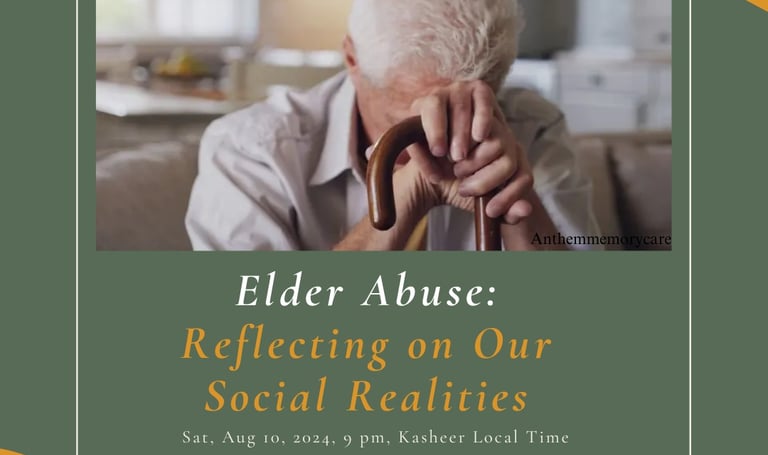Rising Elder Abuse in Kashmiri Society: A Call for Urgent Remedial Action
FEATUREDSOCIETY


In a recent live session, critical voices from the Kashmiri community, Prof Zahoor Ahmad Shah Al-Madani and Dr Zubair Saleem, came together to address a deeply concerning issue: the rising rates of elder abuse in Kashmir. The discussion provided a comprehensive overview of the problem, its underlying causes, and actionable remedial measures. Below, we break down the key points and insights shared during this important session.

Understanding Elder Abuse
The Growing Crisis
Elder abuse is emerging as a critical social problem in Kashmir, affecting the physical, emotional, and financial well-being of the elderly. Traditionally, Kashmiri society upheld respect and care for its senior citizens. However, modern pressures and changing social dynamics have contributed to an erosion of these values, leading to an increase in neglect, mistreatment, and exploitation of the elderly.
Forms of Abuse
The live discussion highlighted that elder abuse in Kashmir can take many forms, including:
Physical Abuse: Violence or physical harm inflicted on older individuals.
Emotional Abuse: Insults, humiliation, and isolation that leave deep psychological scars.
Financial Exploitation: Misuse of an elder’s assets, often through coercion or fraud.
Neglect: Failure to provide necessary care, leading to deteriorating health and quality of life.
Insights from the Experts
Prof Zahoor Ahmad Shah Al-Madani provided a historical and cultural perspective on elder care in Kashmir. He noted that:
Cultural Shifts: With rapid urbanization and migration, traditional family structures that once safeguarded the elderly are weakening.
Loss of Traditional Values: Economic hardships and modern lifestyles have contributed to a decline in the collective responsibility once felt for the aged.
Need for Awareness: He stressed the importance of rekindling cultural norms of respect and care, reminding society of the spiritual and social imperatives to honor the elderly.
Dr Zubair Saleem offered a practical, solutions-oriented approach, emphasizing:
Legal Frameworks: There is an urgent need to strengthen laws that protect the rights of older citizens. Enhanced legislation could act as both a deterrent against abuse and a means to ensure justice for victims.
Community Involvement: Dr Saleem underscored the role of community-based initiatives. Empowering local organizations and encouraging intergenerational dialogue can help restore the dignity of the elderly.
Social Services and Support Systems: Investment in healthcare, counselling, and social support for older adults is vital. These services can alleviate the burden on families and provide a safety net for vulnerable elders.
Remedial Measures: A Multi-Pronged Approach
Based on the insights shared, the discussion identified several key remedial measures:
1. Legal and Policy Reforms
Stricter Legislation: Implementing and enforcing robust laws against elder abuse can create accountability.
Government Oversight: Establishing dedicated governmental bodies to monitor and address cases of abuse.
2. Strengthening Social Welfare Systems
Healthcare Access: Expanding healthcare services tailored for the elderly, including mental health support, is critical.
Economic Support: Social security programs and pension reforms can protect elders from financial exploitation and neglect.
3. Community and Cultural Initiatives
Public Awareness Campaigns: Educating the public about the value and rights of the elderly can help shift cultural attitudes.
Community Centers: Creating safe spaces where seniors can receive care, socialize, and engage in cultural activities helps rebuild the traditional support networks.
4. Empowering Families
Family Counselling: Offering counselling services to families can help address underlying conflicts and stressors that contribute to abuse.
Intergenerational Programs: Programs that encourage interaction between younger and older generations can reinforce mutual respect and understanding.
The Broader Implications
The live session not only shed light on the distressing trend of elder abuse but also emphasized the broader implications for Kashmiri society. As traditional values wane in the face of modern challenges, there is a risk of losing the moral fabric that binds communities together. The experts argued that protecting the elderly is not merely a social obligation—it is integral to the overall health and progress of society.
Restoring the dignity of Kashmiri elders requires a collective effort from government, civil society, and families. By combining legal, social, and cultural strategies, Kashmir can begin to reverse the trend of abuse and honor its heritage of caring for the aged.
Conclusion
The live session with Prof Zahoor Ahmad Shah Al-Madani and Dr Zubair Saleem provided a sobering yet hopeful look at the issue of rising elder abuse in Kashmiri society. Their insights remind us that the well-being of the elderly is a cornerstone of a compassionate and just society. By advocating for robust legal measures, comprehensive social services, and a revival of traditional cultural values, the discussion charted a path forward to safeguard the rights and dignity of Kashmir’s senior citizens.
As Kashmiri society continues to evolve, it is imperative that every stakeholder—from policymakers to community members—commits to protecting its most vulnerable. In doing so, Kashmir can honour its past while forging a future built on fairness, respect, and dignity for all.
